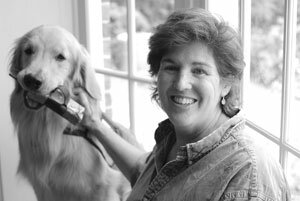FACETIME- Law's school: Fighting disabilities, one dog at a time
"They don't fold, but they can get laundry out of the dryer," says Peggy Law of the identical black lab siblings who are in advanced training at Service Dogs of Virginia. As it turns out, the dogs will spend the afternoon painting, since they have to finish some pieces Law hopes to sell at an upcoming fundraiser.
Having worked in zoos and veterinarian offices for many years, Law, now 53, long ago realized the potential for animals to help people with disabilities. But in 1998, Law's own serious horse accident catalyzed her decision to train service dogs professionally. "I just realized," she says, "how life can change in the blink of an eye."
Since 2000, when she founded the non-profit company, Law has moved steadily closer to her goal to place 15 dogs per year, but the client waiting list just keeps growing.
"Peggy is an extremely caring woman who really puts her heart and soul into working with service dogs," says Robbie Bingler, who received his dog, Harpo, from the organization three years ago. "She's one of the most dedicated individuals I know."
Though Law mainly trains the dogs to facilitate a client's physical independence, she's floored by the magnetic animals' capacity to also enhance social and emotional lives. She tells how one client, confined to a wheelchair by cerebral palsy, could hardly navigate through a crowd. "Why did the dog make a difference?" asks Law. "Because she was invisible before. It just slays me. And that's not even something we train the dogs to do."
After several local inquiries planted the idea, Law recently decided to try a new challenge: training dogs to serve autistic children.
"The primary goal is safety for the child, who learns not to dash off," explains Law, "because the dog is tethered to the child and trained to stay until cued by the parent."
Most remarkably perhaps, a dog may help draw an autistic child out of his characteristic "own-world" existence. A canine companion brings lots of positive attention, and thus frequent opportunities for the child to practice healthy social interaction. "And then there's the bond," says Law, which may be beneficial for a child who does not easily form relationships.
While Law hopes one of her dogs will soon be ready to tackle autism, she admits it's "horribly hard" to give up a dog she may have raised since puppyhood. "Trust me, I do fall in love with the dogs again and again," she says. "But when you see the dog with its owner, and see that beautiful partnership, you understand that you've truly given a gift of love, a gift that's incomparable. And that's why I do what I do."

Peggy Law
PHOTO BY JEN FARIELLO
#